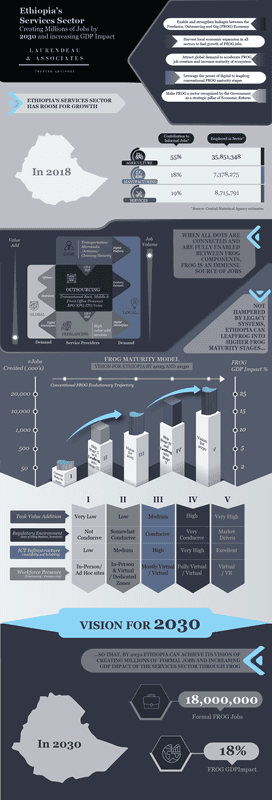Insights
The Freelancing, Outsourcing, Gigs (FROG) Economy in Ethiopia

Jan 5, 2021
The nature of work is rapidly evolving around the world, primarily driven by the spread of technology and digital platforms.
Ethiopia’s Informal Sector
Ethiopia’s Services Sector has room for growth. Indeed, in 2018 close to 36 million were employed in the agriculture sector which contributed to 55% of informal jobs, over 7 million were employed in the manufacturing sector which contributed to 18% of informal jobs, and only around 8 million were employed in the sector sector which contributed to 19% of informal jobs[1].
In addition, if jobs in the informal sector can be given the recognition they deserve and defined using new job standards such as freelancer and gig, millions of formal dignifying jobs can be created in the next few years, especially if supported by digital. The Jobs Creation Commission recognizes informal employment and the gig economy as a crucial mode of employment for millions of citizens and that it should be supported with proper policy directives.
In Kenya, 5 million gig jobs were created in 2020, where 80% of gig workers accessed gigs through mobile and 60% joined digital platforms in the last two years[2]. This example from Kenya- half the population of Ethiopia- not only illustrates the volume of jobs digital platforms can bring up to the surface but also the speed at which it can penetrate the workforce, if done in an inclusive way. Millions in Ethiopia are still unbanked and financially excluded hence digital payments constitute an opportunity for all to obtain access to formal financial and digital services.
Digital Payments
With internet penetration increasing every year in Ethiopia, Medium, Small and Large Businesses are increasingly adopting digital marketing and digital payment solutions (QR code, contactless payments, cryptocurrencies and biometrics). With the telecommunication sector privatization and liberalization, internet penetration might reach upwards of 90% in the next 5 years. It is therefore important to ensure that digital payments are inclusive of all sectors and layers of society, while making all transactions secure. The Ethiopian Digital Payment Strategy approved in June 2021 constitutes an essential addition to the portfolio of policies recently issued in view of digitizing Ethiopia and ensuring an inclusive ecosystem.
The FROG economy in Ethiopia
There is a growing list of private sector actors providing services directly or indirectly related to Freelancing and Gigs especially through digital means. A taskforce was formed at the JCC to assemble the most established players in the FROG economy, to place FROG at the core of Ethiopia's Services sector transformation. Indeed, FROG has the potential to accelerate job creation and add significant value to Ethiopia’s economy. By coming together as a unified team, taskforce members are identifying linkages between Freelancing, Outsourcing and Gigs business models as well as sharing best practices and information. More specifically the taskforce is identifying challenges and opportunities, defining potential interventions to address issues, and defining a unified national pitch for the sector. Overall, the objectives of the FROG taskforce are to enable and strengthen linkages between the elements of Freelancing, Outsourcing and Gig Economy, make FROG a sector recognized by the Ethiopian Government as a strategic pillar of economic reform, leverage the power of digital to leapfrog conventional FROG maturity stages, attract global demand to accelerate FROG job creation and increase maturity of ecosystem, and harvest local economic expansion in all sectors to fuel growth of FROG jobs.
Ethiopia as an Offshoring Destination and the Emerging Outsourcing industry
As part of their rightshoring strategies, Fortune 500's and multinationals have developed a knee-jerk reaction relocating their middle and back-office processes to India, the Philippines, Eastern Europe, North Africa and Central America. But as labor cost continues to rise in those parts of the world, some African countries are emerging as alternative destinations, especially due to labor arbitrage and the high availability of trainable talent.
Ethiopia is the second most populous nation in Africa, with more than two hundred thousand students graduating each year with a STEM degree. Talent cost is on average fifteen times cheaper when compared to western countries, and very competitive when even compared to South Africa.
For Ethiopia, positioning the country as an offshoring destination for multinationals as well as developing the local outsourcing industry could have a tremendous impact on the GDP. If on average, an Ethiopia-based company charges $15 USD for every employee in its call center, offshore development center and the like – which is still a very competitive rate compared to conventional offshoring destination – the revenue collected for every 5000 employees amounts to $150 million USD per year. This would represent significant tax income for the country in hard currency. A similar effect could be had by attracting global freelancing demand through digital platforms.

[1] 2018 Ethiopian Central Statistical Agency estimates
[2] Mastercard, September 2020, The Gig Economy in East Africa White-Paper